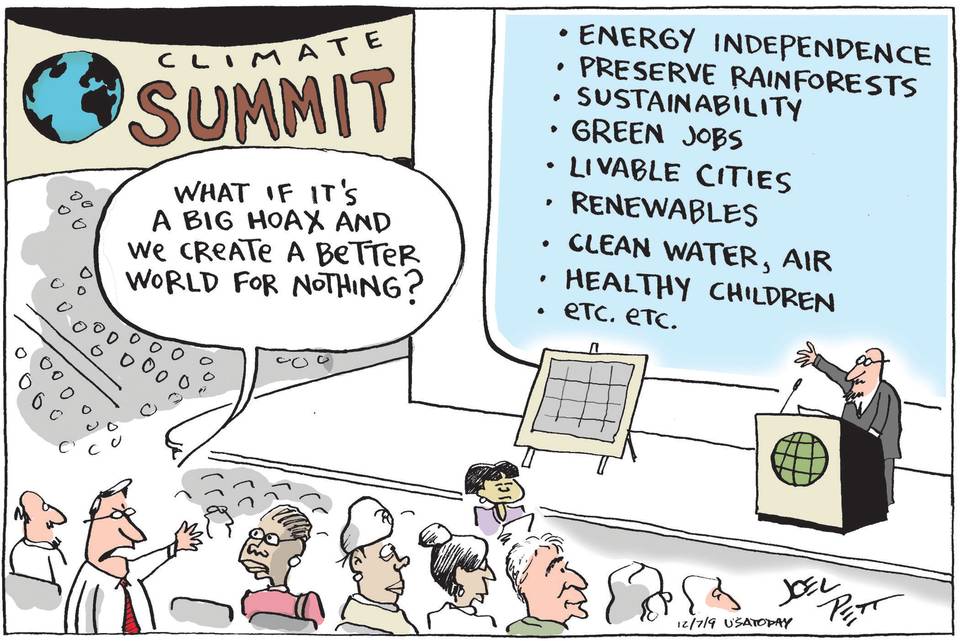Jonathan Choi, chemicals policy fellow, and Ananya Roy, health scientist, coauthored this post.
It was December 2009. The newly elected President Barack Obama was spending his first Christmas in the White House, the Black Eyed Peas’ “Boom Boom Pow” was at the top of the Billboard year end charts, and the iPhone 3GS was the new kid on the block. Meanwhile, the environmental community’s eyes were turned towards Copenhagen, where climate negotiators were working to try to craft a lasting international agreement on emissions. In the middle of the negotiations, Joel Pett published a comic in USA Today (reposted here), which has stuck in the minds of a lot of us who spend time thinking about environmental issues.
So when a recent scientific review by Dr. Frederica Perera at Columbia University came to the scientists on our team, we couldn’t help but remember the point Joel made with his poignant graphic back in 2009. Namely, that by reducing fossil fuel combustion we can not only reduce our impact on climate change, but that we can have cleaner air and healthier children. The review draws our attention to the unique effect that fossil fuel combustion has on children’s health, both by accelerating climate change and by increasing their exposure to air pollutants.
Climate Change and Children’s Health
As you likely know, the pollution that comes out of tailpipes and smokestacks contributes to climate change, which increases the probability of extreme flooding, intense storms, and heat waves. Dr. Perera’s article points to such a heat wave in California in 2006, where 2,500 children were admitted to emergency rooms. And, as a study recently reported, the number of record-breaking heat events is roughly 5 times higher than expected in a climate with no long-term warming. Even the recent Zika virus epidemic may be linked to climate change, where warmer temperatures increase the rate at which mosquitoes bite and increase the geographical range o mosquito habitat.
Dr. Perera also pointed to World Health Organization estimate that climate change has already contributed to dramatic reductions in human quality of life — mainly due to increases in diarrhea, malaria, and malnutrition among children (5 million years of life lost due to premature death or lived with disability in 2000 alone). And 66.5 million children worldwide, the deaths of 600,000 children attributed to weather related events from 1990-2000.
There are also psychological and emotional costs to climate change which can have lifelong impacts on our children’s psyches. With the burning of fossil fuels, comes an increased risk of extensive flooding and drought. Homes, neighborhoods, and communities are left broken in the face of these kinds of disasters. Just as the buildings themselves may be destroyed, so too are relationships as people are displaced from childhood homes.
Air Pollution and Children’s Health
Though much of the focus on fossil fuel combustion has been on the side of energy and climate change, we also need to remember fossil fuel combustion’s contribution to air pollution. Globally, combustion of fossil fuels represents 82% of the energy supply and the largest human source of carbon dioxide — that notorious pollutant driving a lot of climate change. But fossil fuels are also a major source of a whole alphabet soup of air pollutants (PM2.5, SOx, NOx, VOCs, O3, PAHs, etc.) that are known to affect human health.
Children are especially susceptible to the health effects of air pollutants because they spend more time outdoors, breathe a larger proportion of air relative to their body size, and have less developed vital organs (like lungs and neurological systems) and natural defenses. The article reviews studies from around the world demonstrating that children who live in areas with higher air pollution have lower lung growth, worse asthma, and are more prone to other respiratory problems. On top of that, mounting scientific research is beginning to link air pollution with delays in neurodevelopment, deficits in cognition, increases in autism spectrum disorders, and increased use of psychiatric medication among children.
The issue also extends to pregnant women, raising concerns for the 62 million women in the US who are of childbearing age. The article highlights the fact that exposure to air pollutants is associated with a 10-30% increase in pre-term and low birth weight births, placing them at higher risk for neurodevelopmental delays and cardio-metabolic disease as adults.
The Good News
While air pollution and climate change still loom large, we have made significant progress since Joel’s comic was published in 2009. The historic 2015 Paris Agreement sets the groundwork to begin tackling climate change on a global level. Here in the US, EPA’s new Clean Power Plan will be an important start to tamping down domestic CO2 emissions and air pollution. So, as we continue to reduce fossil fuel combustion we will be able to celebrate reductions in emissions responsible for climate change and air pollution, both of which will protect our children’s health.











One Comment
CO2 is not the cause of global warming which started around 1920 when CO2 was 300 ppm. See
http://www.pbs.org/wgbh/warming/etc/graphs.html as well as Climate Lab Book. The cause was the heat emitted from our energy use of 1 terawatt (at that time) and which has steadily increased passing 16 terawatts in 2008. The obsession with CO2 has led to expensive and counter-productive plans and installations to capture and store CO2 (CCS), and to more nuclear power plants.